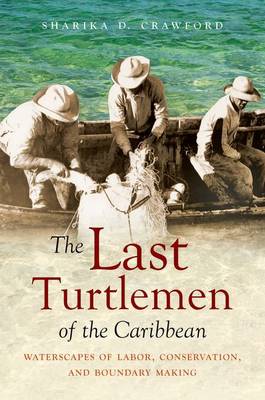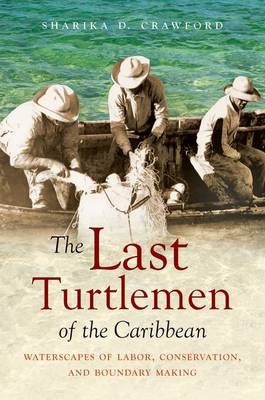
- Afhalen na 1 uur in een winkel met voorraad
- Gratis thuislevering in België vanaf € 30
- Ruim aanbod met 7 miljoen producten
- Afhalen na 1 uur in een winkel met voorraad
- Gratis thuislevering in België vanaf € 30
- Ruim aanbod met 7 miljoen producten
Zoeken
The Last Turtlemen of the Caribbean
Waterscapes of Labor, Conservation, and Boundary Making
Sharika D Crawford
€ 49,95
+ 99 punten
Omschrijving
Illuminating the entangled histories of the people and commodities that circulated across the Atlantic, Sharika D. Crawford assesses the Caribbean as a waterscape where imperial and national governments vied to control the profitability of the sea. Crawford places the green and hawksbill sea turtles and the Caymanian turtlemen who hunted them at the center of this waterscape. The story of the humble turtle and its hunter, she argues, came to play a significant role in shaping the maritime boundaries of the modern Caribbean.
Crawford describes the colonial Caribbean as an Atlantic commons where all could compete to control the region's diverse peoples, lands, and waters and exploit the region's raw materials. Focusing on the nineteenth and twentieth centuries, Crawford traces and connects the expansion and decline of turtle hunting to matters of race, labor, political and economic change, and the natural environment. Like the turtles they chased, the boundary-flouting laborers exposed the limits of states' sovereignty for a time but ultimately they lost their livelihoods, having played a significant role in legislation delimiting maritime boundaries. Still, former turtlemen have found their deep knowledge valued today in efforts to protect sea turtles and recover the region's ecological sustainability.
Crawford describes the colonial Caribbean as an Atlantic commons where all could compete to control the region's diverse peoples, lands, and waters and exploit the region's raw materials. Focusing on the nineteenth and twentieth centuries, Crawford traces and connects the expansion and decline of turtle hunting to matters of race, labor, political and economic change, and the natural environment. Like the turtles they chased, the boundary-flouting laborers exposed the limits of states' sovereignty for a time but ultimately they lost their livelihoods, having played a significant role in legislation delimiting maritime boundaries. Still, former turtlemen have found their deep knowledge valued today in efforts to protect sea turtles and recover the region's ecological sustainability.
Specificaties
Betrokkenen
- Auteur(s):
- Uitgeverij:
Inhoud
- Aantal bladzijden:
- 216
- Taal:
- Engels
- Reeks:
Eigenschappen
- Productcode (EAN):
- 9781469660219
- Verschijningsdatum:
- 26/10/2020
- Uitvoering:
- Paperback
- Formaat:
- Trade paperback (VS)
- Afmetingen:
- 156 mm x 234 mm
- Gewicht:
- 340 g

Alleen bij Standaard Boekhandel
+ 99 punten op je klantenkaart van Standaard Boekhandel
Beoordelingen
We publiceren alleen reviews die voldoen aan de voorwaarden voor reviews. Bekijk onze voorwaarden voor reviews.








